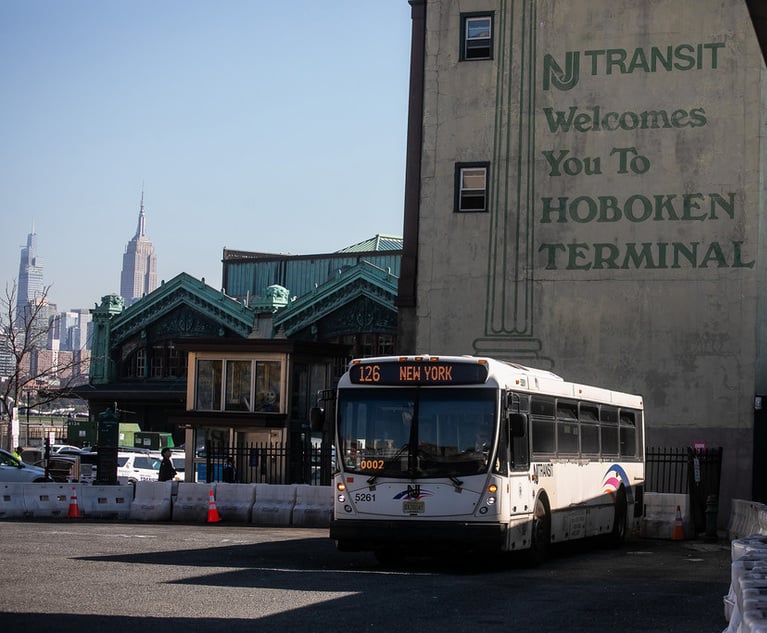 Luis Restrepo
Luis RestrepoSovereign Immunity Shields NJ Transit From $824K Award
The Third Circuit ruled the transit agency is a branch of the state of New Jersey, which entitled it to immunity.
January 30, 2019 at 04:24 PM
4 minute read
The U.S. Court of Appeals for the Third Circuit has vacated an $824,152 judgment awarded to a New Jersey Transit employee who was injured on the job, citing the court's holding in another recent case that the agency is an arm of the state of New Jersey and entitled to sovereign immunity.
The appeals court's ruling in Robinson v. New Jersey Transit Rail Operations leaves railroad maintenance worker Quitman Robinson empty-handed despite the severe injuries he suffered in a 2011 accident. The appeals court's January 2018 decision in Karns v. Shanahan, that New Jersey Transit is an arm of the state entitled to sovereign immunity, dictates that the U.S. District Court's judgment in Robinson should be vacated and remanded with instructions to dismiss the case, said Third Circuit Judge L. Felipe Restrepo, who was joined by Judges Theodore McKee and Julio Fuentes.
A final judgment was entered for Robinson in October 2017 after a two-day jury trial on claims under the Federal Employee Liability Act that negligence by New Jersey Transit caused his injuries. New Jersey Transit did not raise the immunity argument at trial but afterward it sought to vacate the judgment, arguing it was entitled to sovereign immunity. Applying a Third Circuit case from 1989, Fitchik v. N.J. Transit Rail Operations, U.S. District Judge Stanley Chesler rejected the sovereign immunity argument on Oct. 10, 2017. New Jersey Transit appealed.
Meanwhile, on Jan. 22, 2018, the Third Circuit issued the Karns ruling, finding the agency is immune from suit. Karns was brought by two evangelical ministers who were arrested for preaching at the Princeton Junction train station without a permit. Two of the three judges on the Karns panel said the intervening U.S. Supreme Court ruling in Regents of the University of California v. Doe led them to depart from the reasoning in Fitchik.
In Doe, issued in 1997, the court ruled a would-be employee at a University of California laboratory who was denied a job over the lack of a security clearance was barred under the Eleventh Amendment from bringing a breach-of-contract action against the university in federal court.
A dissenting judge on the Karns panel said Fitchik was still valid law in spite of Doe.
Although New Jersey Transit did not assert sovereign immunity in Robinson's case until after trial, the Eleventh Amendment defense acts as a jurisdictional bar that need not be raised in the trial court, Restrepo wrote for the court.
“While we are sympathetic to Mr. Robinson's unfortunate situation, we are also bound by precedent that prohibits him from filing suit against N.J. Transit to recover damages for his injuries,” Restrepo wrote,
Robinson was represented by Lawrence Katz and Robert Myers of Coffey Kaye Myers & Olley in Bala Cynwyd, Pennsylvania, and Marc Wietzke of Flynn & Wietzke in Garden City, New York. They said they intend to continue to challenge Karns in the Third Circuit.
Wietzke said Karns was incorrectly decided because of an incomplete record concerning the Fitchik factors, leading to several erroneous conclusions. And there was also no such record in Robinson, where the trial court rejected the plaintiff's request to conduct proper discovery to create the requisite record.
“In other words, plaintiff was never provided a chance to show the Circuit Court of Appeals what it needed to make such a weighty decision,” Wietzke said. “The Circuit Court also refused to allow amicus filings, which would have provided record evidence from which a proper analysis could be performed. Lastly, the Circuit Court ignored the fact and argument that in this particular case, the railroad was asked before trial to present any potential issues regarding jurisdiction, and it said that jurisdiction was consented to. In other words, the railroad specifically waived the immunity, thus lulling the parties and the Court into removing the issue of sovereign immunity from requiring any record,” Wietzke said.
Katz added that the appellate court never addressed the plaintiff's argument that New Jersey Transit waived its immunity when it consented to the court's jurisdiction throughout the proceedings and specifically in a final pretrial order.
Deputy Attorneys General Kevin Fleming, Robert McGuire and Gregory Sullivan represented the state. The attorney general's office did not immediately respond to a request for comment.
This content has been archived. It is available through our partners, LexisNexis® and Bloomberg Law.
To view this content, please continue to their sites.
Not a Lexis Subscriber?
Subscribe Now
Not a Bloomberg Law Subscriber?
Subscribe Now
NOT FOR REPRINT
© 2024 ALM Global, LLC, All Rights Reserved. Request academic re-use from www.copyright.com. All other uses, submit a request to [email protected]. For more information visit Asset & Logo Licensing.
You Might Like
View All
Hit by Mail Truck: Man Agrees to $1.85M Settlement for Spinal Injuries

$945K Settlement Reached in Fatal Crash After Truck Driver Fell Asleep at Wheel
3 minute read
'That's Insane': Lawyers Weigh In on Fallout From Uber's User Agreement
7 minute read
NY's Top Court Mulls Fate of Personal Injury Claims Against NJ Transit Corp.
Trending Stories
Who Got The Work
Michael G. Bongiorno, Andrew Scott Dulberg and Elizabeth E. Driscoll from Wilmer Cutler Pickering Hale and Dorr have stepped in to represent Symbotic Inc., an A.I.-enabled technology platform that focuses on increasing supply chain efficiency, and other defendants in a pending shareholder derivative lawsuit. The case, filed Oct. 2 in Massachusetts District Court by the Brown Law Firm on behalf of Stephen Austen, accuses certain officers and directors of misleading investors in regard to Symbotic's potential for margin growth by failing to disclose that the company was not equipped to timely deploy its systems or manage expenses through project delays. The case, assigned to U.S. District Judge Nathaniel M. Gorton, is 1:24-cv-12522, Austen v. Cohen et al.
Who Got The Work
Edmund Polubinski and Marie Killmond of Davis Polk & Wardwell have entered appearances for data platform software development company MongoDB and other defendants in a pending shareholder derivative lawsuit. The action, filed Oct. 7 in New York Southern District Court by the Brown Law Firm, accuses the company's directors and/or officers of falsely expressing confidence in the company’s restructuring of its sales incentive plan and downplaying the severity of decreases in its upfront commitments. The case is 1:24-cv-07594, Roy v. Ittycheria et al.
Who Got The Work
Amy O. Bruchs and Kurt F. Ellison of Michael Best & Friedrich have entered appearances for Epic Systems Corp. in a pending employment discrimination lawsuit. The suit was filed Sept. 7 in Wisconsin Western District Court by Levine Eisberner LLC and Siri & Glimstad on behalf of a project manager who claims that he was wrongfully terminated after applying for a religious exemption to the defendant's COVID-19 vaccine mandate. The case, assigned to U.S. Magistrate Judge Anita Marie Boor, is 3:24-cv-00630, Secker, Nathan v. Epic Systems Corporation.
Who Got The Work
David X. Sullivan, Thomas J. Finn and Gregory A. Hall from McCarter & English have entered appearances for Sunrun Installation Services in a pending civil rights lawsuit. The complaint was filed Sept. 4 in Connecticut District Court by attorney Robert M. Berke on behalf of former employee George Edward Steins, who was arrested and charged with employing an unregistered home improvement salesperson. The complaint alleges that had Sunrun informed the Connecticut Department of Consumer Protection that the plaintiff's employment had ended in 2017 and that he no longer held Sunrun's home improvement contractor license, he would not have been hit with charges, which were dismissed in May 2024. The case, assigned to U.S. District Judge Jeffrey A. Meyer, is 3:24-cv-01423, Steins v. Sunrun, Inc. et al.
Who Got The Work
Greenberg Traurig shareholder Joshua L. Raskin has entered an appearance for boohoo.com UK Ltd. in a pending patent infringement lawsuit. The suit, filed Sept. 3 in Texas Eastern District Court by Rozier Hardt McDonough on behalf of Alto Dynamics, asserts five patents related to an online shopping platform. The case, assigned to U.S. District Judge Rodney Gilstrap, is 2:24-cv-00719, Alto Dynamics, LLC v. boohoo.com UK Limited.
Featured Firms
Law Offices of Gary Martin Hays & Associates, P.C.
(470) 294-1674
Law Offices of Mark E. Salomone
(857) 444-6468
Smith & Hassler
(713) 739-1250






